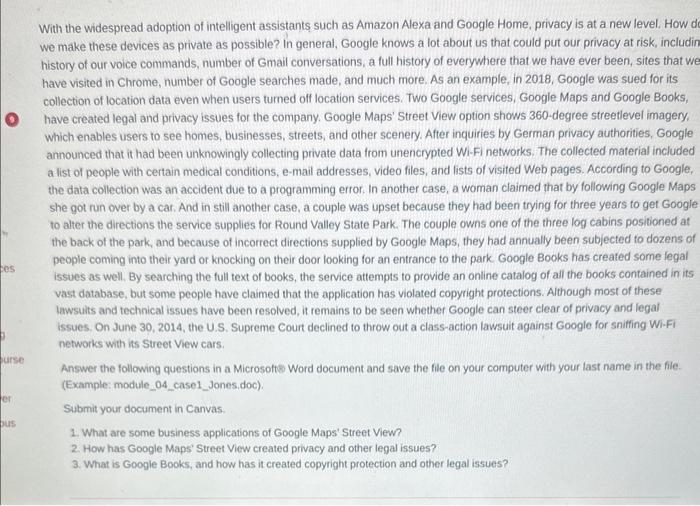answer the following questions.

With the widespread adoption of intelligent assistants such as Amazon Alexa and Google Home, privacy is at a new level. How we make these devices as private as possible? In general, Google knows a lot about us that could put our privacy at risk, includi history of our voice commands, number of Gmail conversations, a full history of everywhere that we have ever been, sites that w have visited in Chrome, number of Google searches made, and much more. As an example, in 2018, Google was sued for its collection of location data even when users turned off location services. Two Google services, Google Maps and Google Books, have created legal and privacy issues for the company. Google Maps' Street View option shows 360-degree streetlevel imagery, which enables users to see homes, businesses, streets, and other scenery. After inquiries by German privacy authorities, Google announced that it had been unknowingly collecting private data from unencrypted Wi-Fi networks. The collected material included a list of people with certain medical conditions, e-mail addresses, video files, and lists of visited Web pages. According to Google, the data collection was an accident due to a programming error. In another case, a woman claimed that by following Google Maps she got run over by a car. And in still another case, a couple was upset because they had been trying for three years to get Google to alter the directions the service supplies for Round Valley State Park. The couple owns one of the three log cabins positioned at the back of the park, and because of incorrect directions supplied by Google Maps, they had annually been subjected to dozens of people coming into their yard or knocking on their door looking for an entrance to the park Google Books has created some legal issues as well, By searching the full text of books, the service attempts to provide an online catalog of all the books contained in its vast database, but some people have claimed that the application has violated copyright protections. Although most of these lawsuits and technical issues have been resolved, it remains to be seen whether Google can steer clear of privacy and legal issues. On June 30, 2014, the U.S. Supreme Court declined to throw out a class-action lawsuit against Google for sniffing Wi-Fi networks with its Street View cars. Answer the following questions in a Microsofte Word document and save the file on your computer with your last name in the file. (Example: module_04_case1_Jones,doc). Submityour document in Canvas. 1. What are some business applications of Google Maps' Street View? 2. How has Google Maps' Street View created privacy and other legal issues? 3. What is Google Books, and how has it created copyright protection and other legal issues? Submit your document in Canvas. 1. What are some business applications of Google Maps' Street View? 2. How has Google Maps' Street View created privacy and other legal issues? 3. What is Google Books, and how has it created copyright protection and other legal issues









